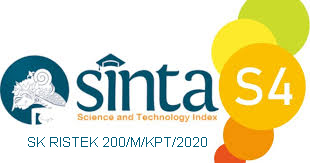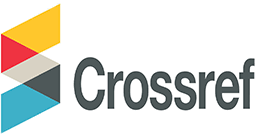Analysis of Factors that Affect the Success of E-Learning Implementation of STMIK BI Balikpapan
Abstract
Keywords
Full Text:
PDFReferences
F. D. Davis, “Perceived Usefulness, Perceived Ease of Use, and User Acceptance of Information Technology,” MIS Q., vol. 13, no. 3, pp. 319–340, 1989.
L. G. Tornatzky and M. Fleischer, “The processes of technological innovation,” J. Technol. Transf., vol. 16, no. 1, pp. 45–46, 1990.
A. Ahmadi and M. Wakid, “Evaluasi Pelaksanaan E-learning Pembelajaran Sistem Kelistrikan Siswa Kelas X Teknik Otomotif SMK N 2 Pengasih,” J. Pendidik. Tek. Otomotif, vol. 14, no. 2, pp. 23–40, 2016.
M. Sihotang and W. S. Nugroho, “Investigasi Faktor-Faktor Yang Mempengaruhi Partisipasi Diskusi Online: Studi Kasus Student-Centered E-Learning Environment Magister Teknologi Informasi Universitas Indonesia,” J. Sist. Inf., vol. 11, no. 1, pp. 1–12, 2015.
S. Sopyah, “Analisis Penerimaan Mobile Banking Menggunakan Teori TAM,” Universitas Bina Nusantara, 2018.
Sugiyono, Metode Penelitian Kuantitatif, Kualitatif dan R&D. Bandung: Alfabet, 2019.
V. Venkatesh, J. Y. L. Thong, and X. Xu, “Consumer Acceptance and Use of Information Technology : Extending The Unified Theory of Acceptance and Use of Technology,” MIS Q., vol. 36, no. 1, pp. 157–178, 2012.
M. Kocaleva, I. Stojanovic, and Z. Zdravev, “Model of e-Learning Acceptance and Use for Teaching Staff in Higher Education Institutions,” Int. J. Mod. Educ. Comput. Sci., vol. 7, no. 4, pp. 23–31, 2015.
T. Handayani and S. Sudiana, “Analisis Penerapan Model Utaut (Unified Theory of Acceptance and Use of Technology) Terhadap Perilaku Pengguna Sistem Informasi (Studi Kasus: Sistem Informasi Akademik Pada Sttnas Yogyakarta),” Angkasa J. Ilm. Bid. Teknol., vol. 7, no. 2, p. 165, 2017.
I. Ghozali and H. Latan, Partial Least Square Konsep, Teknik, dan Aplikasi Menggunakan Program Smart PLS 3.0 untuk Penelitian Empiris. Universitas Diponegoro, 2017.
A. S. Hussein, Modul Ajar Penelitian Bisnis dan Manajemen Menggunakan Partial Least Square (PLS) dengan Smart PLS 3.0. Malang: Jurusan Manajemen Fakultas Ekonomi dan Bisnis UNIVERSITAS BRAWIJAYA, 2015.
M. Tenenhaus, S. Amato, and V. E. Vinzi, “A global Goodness – of – Fit index for PLS structural,” in XLII SIS scientific meeting, 2004, pp. 739–742.
W. Wu and L. Hwang, “The Effectiveness of e-Learning for Blended Courses in Colleges: a Multi-level Empirical Study,” Int. J. Electron. Bus. Manag., vol. 8, no. 4, pp. 312–322, 2010.
A. T. Winoto, “Analisis Faktor- Faktor yang Mempengaruhi Mahasiswa dalam Menggunakan Sistem Diskusi Online SCeLe di Program Magister Teknologi Informasi Universitas Indonesia,” Universitas Indonesia, 2013.
DOI: https://doi.org/10.31326/jisa.v4i1.894
Refbacks
- There are currently no refbacks.
Copyright (c) 2021 Surmiati Surmiati, Elvin Leander Hadisaputro, Joy Nashar Utamajaya

This work is licensed under a Creative Commons Attribution-ShareAlike 4.0 International License.
JOURNAL IDENTITY
Journal Name: JISA (Jurnal Informatika dan Sains)
e-ISSN: 2614-8404, p-ISSN: 2776-3234
Publisher: Program Studi Teknik Informatika Universitas Trilogi
Publication Schedule: June and December
Language: English
APC: The Journal Charges Fees for Publishing
Indexing: EBSCO , DOAJ, Google Scholar, Arsip Relawan Jurnal Indonesia, Directory of Research Journals Indexing, Index Copernicus International, PKP Index, Science and Technology Index (SINTA, S4) , Garuda Index
OAI address: http://trilogi.ac.id/journal/ks/index.php/JISA/oai
Contact: jisa@trilogi.ac.id
Sponsored by: DOI – Digital Object Identifier Crossref, Universitas Trilogi
In Collaboration With: Indonesian Artificial Intelligent Ecosystem(IAIE), Relawan Jurnal Indonesia, Jurnal Teknologi dan Sistem Komputer (JTSiskom)
JISA (Jurnal Informatika dan Sains) is Published by Program Studi Teknik Informatika, Universitas Trilogi under Creative Commons Attribution-ShareAlike 4.0 International License.


















